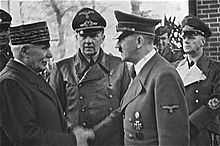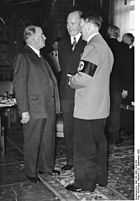Paul Schmidt (interpreter)
| Paul-Otto Schmidt | |
|---|---|
|
Paul Schmidt interpreting between Édouard Daladier and Adolf Hitler at the Munich Conference (September 1938) | |
| Born |
23 June 1899 Berlin, German Empire |
| Died |
21 April 1970 (aged 70) Munich, West Germany |
| Nationality | German |
| Occupation | Liaison Interpreter |
| Known for | Interpreting for Hitler |
Paul-Otto Schmidt (23 June 1899 - 21 April 1970)[1] was an interpreter in the German foreign ministry from 1923-1945. During his career he served as the translator for Neville Chamberlain's negotiations with Adolf Hitler over the Munich Agreement, the British Declaration of War and the surrender of France.
Early years
In 1917/18 Schmidt was a soldier in the First World War and was wounded on the Western Front. Afterward he studied modern languages in Berlin and worked at the same time for an American newspaper agency. In 1921 he took courses in the Foreign Office for the training of conference interpreters. Schmidt distinguished himself there by virtue of his outstanding memory. In July 1923, Schmidt, still preparing for examinations, accepted his first assignment for the translating and interpreting service of the Foreign Office at the Permanent Court of International Justice in the Hague. He married in 1925 and had a son in 1926.
Foreign Office

After more language study in Berlin Schmidt worked briefly in the Reich Foreign Language Office. Starting in 1924 he worked as an interpreter in the Foreign Office. Schmidt interpreted during the Locarno Treaty meetings (1925) and participated in many other important international conferences. He served as an interpreter at the League of Nations (1926-1933) and at the London Economic Conference. Under Reich Chancellor Gustav Stresemann, Schmidt became chief interpreter, a position which he retained after Hitler came to power in 1933. Schmidt remained chief interpreter until 1945. At the Munich Conference he interpreted between Hitler and Neville Chamberlain and Édouard Daladier.
During the war years he served as Hitler's interpreter during his meetings with Marshal Philippe Pétain and Francisco Franco. After the 1942 Dieppe Raid resulted in thousands of Canadian soldiers captured, Schmidt was in charge of their interrogations. Schmidt joined the NSDAP in 1943.[1]
Post-war
Arrested in May 1945, Schmidt was freed by the Americans in 1948. In 1946 he testified at the Nuremberg Trials, where conversations with him were noted down by psychiatrist Leon Goldensohn and later published. In 1947, he testified for the prosecution against the directors of IG Farben. In 1952 he joined the Sprachen and Dolmetscher Institute in Munich, a college where students could learn languages and become translators and interpreters. He retired in 1967.
Schmidt’s memoirs
Entitled An Extra on the Diplomatic Stage, Schmidt’s memoirs cover his 21 years as an important eye witness to European foreign policy. The book begins with Schmidt’s front line experiences during the First World War at the German spring offensive of 1918, and continues with his work for the German Chancellors before 1933. The English edition of the book, titled Hitler’s Interpreter OCLC 1122735, skips this material and describes only the Hitler years, 1933-1945. Schmidt’s memoirs present an atmospheric, yet detailed, portrait of the highest level of the Third Reich. And he has this advice for interpreters in training:
"Over the years I have arrived at the conviction that a good diplomatic interpreter must possess three characteristics: Most important, he must, paradoxically, be able to be silent; he must be expert in the subject he is translating; and only in third place is his mastery of the language he translates."
Bibliography
- Lehrer, Steven (2006). The Reich Chancellery and Führerbunker Complex: An Illustrated History of the Seat of the Nazi Regime. McFarland. p. 214. ISBN 0-7864-2393-5.
- Lehrer, Steven (2002). Hitler Sites: A City-by-city Guidebook (Austria, Germany, France, United States). McFarland. p. 224. ISBN 0-7864-1045-0.
- Goldensohn, Leon N., and Gellately, Robert (ed.): The Nuremberg Interviews, Alfred A. Knopf, New York, 2004 ISBN 0-375-41469-X
References
| Wikimedia Commons has media related to Paul Schmidt. |
| Wikiquote has quotations related to: Paul Schmidt (interpreter) |
